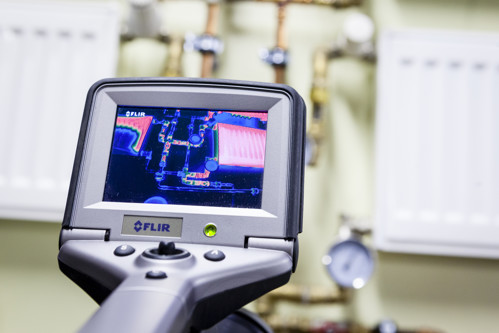Intelligent Buildings
The programme is jointly taught by the Faculty of Civil Engineering (FCE), the Faculty of Mechanical Engineering (FME) and the Faculty of Electrical Engineering (FEE) at the Czech Technical University in Prague. Graduates are professionals in design and operation of integrated building systems (integration of structural design, building services systems and controlling, energetics and information systems).
Tutor: prof. Ing. Jiří Bašta, Ph.D.
 The definition of Intelligent Buildings and the content of the programme defines a higher-quality buildings in comparison
to buildings which are "only" properly designed and operated. The concept of Intelligent Building primarily represents a building
with a very advanced system of operation, control and monitoring (artificial intelligence) without the need for human intervention,
along with system solution of building machinery system. One of the most important things is the Intelligent integration of
devices into building components and appropriate selection of building materials including appropriate conceptual solution
of the building with regard to its future use and operation of integrated systems.
The definition of Intelligent Buildings and the content of the programme defines a higher-quality buildings in comparison
to buildings which are "only" properly designed and operated. The concept of Intelligent Building primarily represents a building
with a very advanced system of operation, control and monitoring (artificial intelligence) without the need for human intervention,
along with system solution of building machinery system. One of the most important things is the Intelligent integration of
devices into building components and appropriate selection of building materials including appropriate conceptual solution
of the building with regard to its future use and operation of integrated systems.
The CTU in Prague aims to extend the range of study programmes by a new prospective study field that will attract more students thanks to the interesting possibility to study at three faculties.
This study programme prepares professionals for design, implementation and management of modern buildings and the development and production of components for Intelligent buildings. Therefore the graduates are experts especially in design and operation of integrated systems for buildings (integration of building solutions, technology systems of buildings, management, energetics and information systems).
Graduates will have a broad range of knowledge, they will not become specialists nor experts. Graduates are suitable for work in architecture studios focused on conceptual design of buildings and solutions of general needs an optimal indoor environment. They are also suitable for management, administration and operation of buildings and facilities of environmental engineering of big buildings, in companies focused on 'Facility Management'. Suitable positions might be also in the following areas: project manager, coordinator, consultancy, research and development of Intelligent Building technologies. Graduates can work in the construction and operation of buildings which are energetically, economically and functionally effective.
As stated above, the graduates of Intelligent Buildings will find suitable jobs in big construction and supply companies in the process of negotiating contracts (investment) and they might also work for investors in the preparation of investment projects as well as manage preparation, assembly and supply work on construction sites for supply and assembly companies in the field of environmental engineering of buildings and energetics. They could also work in the public administration (building offices, state supervision – environment, hygiene). Their professional profile will be useful for cooperation with planners, investors, developers and users of modern buildings.
Intelligent building provides optimal internal environment for the comfort of people or manufacturing production through building
construction, facilities of the environmental control systems, services and management (facility management) and it operates
efficiently - in terms of energy and ecology (environmentally).
The study plan of the faculties contains the following:
- 9 common compulsory subjects - (FCE) Building Heating Technology 1, (FCE) Energy audit of buildings, (FCE) Ecological building systems, (FME) Regulation in technology of building environment, (FME) Radiant and industrial heating, (FME) Air conditioning and industrial ventilation, (FEL) Information and Knowledge systems, (FEL) Sensors and networks, (FEL) Electrical Distribution & Drives
- 2 projects (together by FCE, FME and FEL) Project 1 and Project 2
- Diploma thesis
Student must obtain a total number of 120 ECTS credits. The average number of credits per semester at two-year Master's degree programme IB is 30. The number of teaching hours per week does not exceed 23 hours.
Tutors help the students at the enrolment to choose compulsory elective subjects (CES) with regard to previous education profile of the student. The semester study plan is subsequently approved by the tutor.
Admission Examination to the Master's program Intelligent Buildings will be held at the Faculty of Mechanical Engineering in compliance with the approved admission for other programs to Master's degree.
State final examination (SFE)
Subjects of the SFE:
- 1. Integrated building design - requirements on student's knowledge in this course are based on the thematic contents of compulsory subjects - (FCE) Building Heating Technology 1, (FCE) Energy audit of buildings, (FCE, FME, FEL) Project 1, (FCE, FME FEL) Project 2.
- 2. Systems for intelligent buildings - requirements on student's knowledge in this course are based on the thematic contents of compulsory subjects - (FCE) Ecological Building Systems, (FME) Radiant and industrial heating, (FME) Air conditioning and industrial ventilation, (FEL) Electrical & Drives, (FCE, FME, FEL) Project 1, (FCE, FME, FEL) Project 2.
- 3. Management of intelligent buildings - requirements on student's knowledge in this course are based on the thematic contents of compulsory subjects - (FEL) Information and Knowledge Systems, (FME) Regulation in technology of building environment, (FEL) Sensors and networks, (FCE, FME FEL) Project 1, (FCE, FME FEL) Project 2.
![[design/2014/cvut-logo-en-white.png]](https://fs.cvut.cz/content/images/design/2014/cvut-logo-en-white.png)
![[design/2014/cvut-logo-en-print.jpg]](https://fs.cvut.cz/content/images/design/2014/cvut-logo-en-print.jpg)